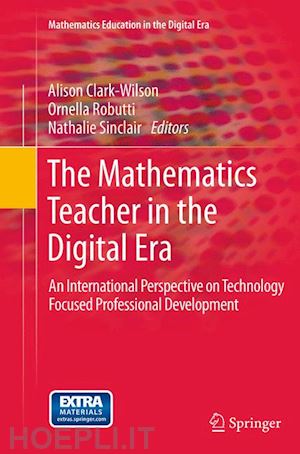
Questo prodotto usufruisce delle SPEDIZIONI GRATIS
selezionando l'opzione Corriere Veloce in fase di ordine.
Pagabile anche con Carta della cultura giovani e del merito, 18App Bonus Cultura e Carta del Docente
This volume addresses the key issue of the initial education and lifelong professional learning of teachers of mathematics to enable them to realize the affordances of educational technology for mathematics. With invited contributions from leading scholars in the field, this volume contains a blend of research articles and descriptive texts.
In the opening chapter John Mason invites the reader to engage in a number of mathematics tasks that highlight important features of technology-mediated mathematical activity. This is followed by three main sections:
Contents.- Opening section. –Foreword: David Pimm.- Introduction: Alison Clark-Wilson, Ornella Robutti and Nathalie Sinclair.- Chapter 0: Interactions between teacher, student, software and mathematics: Getting a purchase on learning with technology: John Mason.- Section A.- Chapter 1: Exploring the quantitative and qualitative gap between expectation and implementation: A survey of English mathematics teachers’ uses of ICT: Nicola Bretscher.- Chapter 2: Teaching with digital technology: Obstacles and opportunities: Michael Thomas and Joann Palmer.- Chapter 3: A developmental model for adaptive and differentiated instruction using classroom networking technology: Allan Bellman, Wellesley R Foshay and Danny Gremillion.- Chapter 4: Integrating technology in the primary school mathematics classroom: The role of the teacher: María Trigueros, María-Dolores Lozano and Ivonne Sandoval.- Chapter 5: Technology integration in secondary school mathematics: The development of teachers’ professional identities: Merrilyn Goos.- Chapter 6: Teaching roles in a technology intensive core undergraduate mathematics course: Chantal Buteau and Eric Muller.- Section B.- Chapter 7: Digital technology and mid-adopting teachers’ professional development: a case study: Paul Drijvers, Sietske Tacoma, Amy Besamusca, Cora van den Heuvel, Michiel Doorman and Peter Boon.- Chapter 8: Teaching mathematics with technology at the kindergarten level :Resources and orchestrations: Ghislaine Geuedet, Laetitia Bueno-Ravel, Caroline Poisard.- Chapter 9: How do teachers integrate technology in their practices? A focus on their instrumental geneses: Mariam Haspekian.- Chapter 10: A methodological approach to researching the development of teachers’ knowledge in a multi-representational technological setting: Alison Clark-Wilson.- Chapter 11: Teachers and technologies: Shared constraints, common responses: Maha Abboud-Blanchard.- Chapter 12: Didactic incidents: A way to improve the professional developmentof mathematics teachers: Gilles Aldon.- Section C.- Chapter 13. Meta-didactical transposition: A theoretical model for teacher education programs: Ferdinando Arzarello, Annalisa Cusi, Rossella Garuti, Nicolina Malara, Francesca Martignone, Ornella Robutti and Cristina Sabena.- Chapter 14: Frameworks for analysing the expertise that underpins successful integration of digital technologies into everyday teaching practice: Kenneth Ruthven.- 15. Conclusion: Alison Clark-Wilson, Ornella Robutti and Nathalie Sinclair.- Index.











Il sito utilizza cookie ed altri strumenti di tracciamento che raccolgono informazioni dal dispositivo dell’utente. Oltre ai cookie tecnici ed analitici aggregati, strettamente necessari per il funzionamento di questo sito web, previo consenso dell’utente possono essere installati cookie di profilazione e marketing e cookie dei social media. Cliccando su “Accetto tutti i cookie” saranno attivate tutte le categorie di cookie. Per accettare solo deterninate categorie di cookie, cliccare invece su “Impostazioni cookie”. Chiudendo il banner o continuando a navigare saranno installati solo cookie tecnici. Per maggiori dettagli, consultare la Cookie Policy.